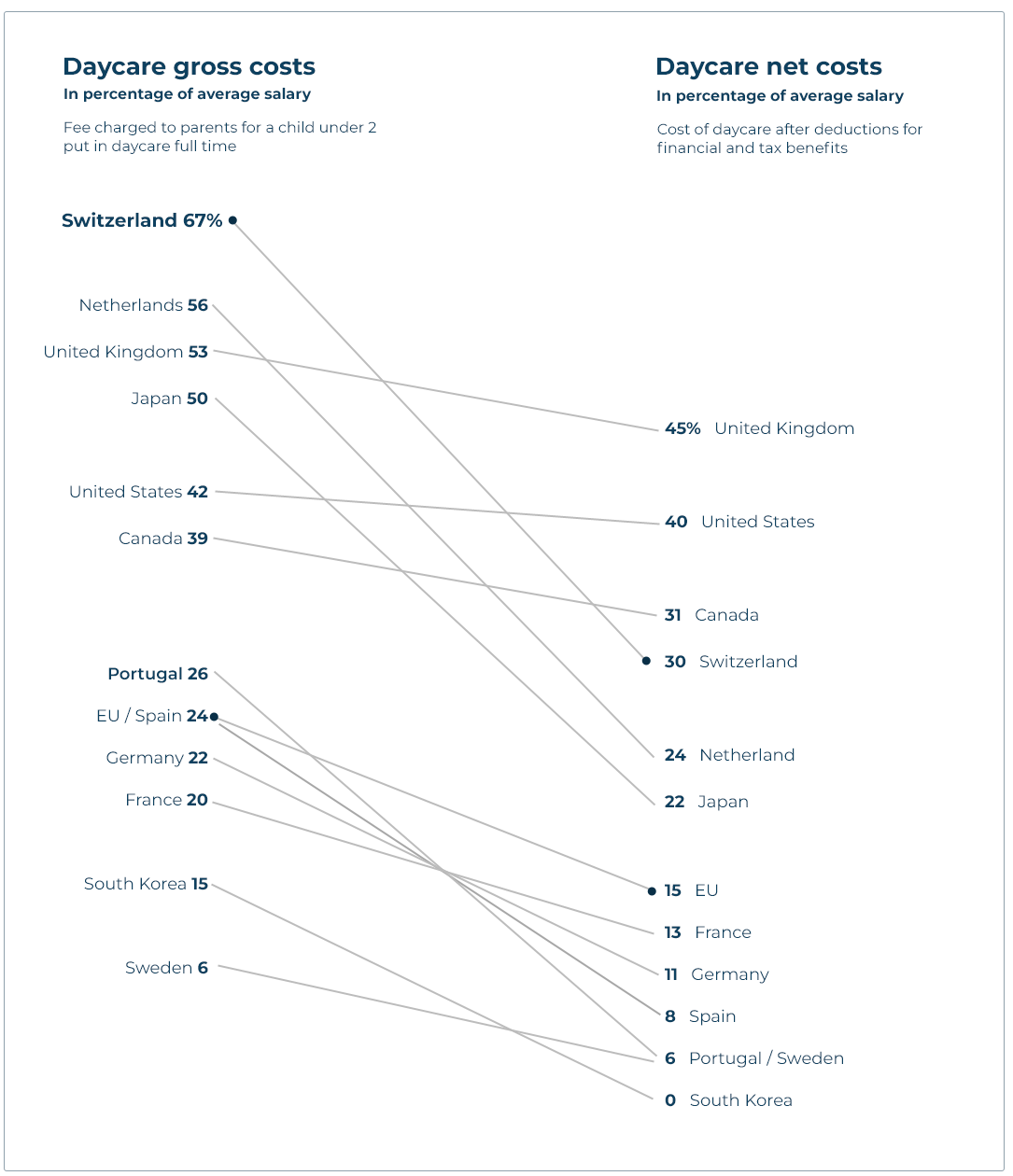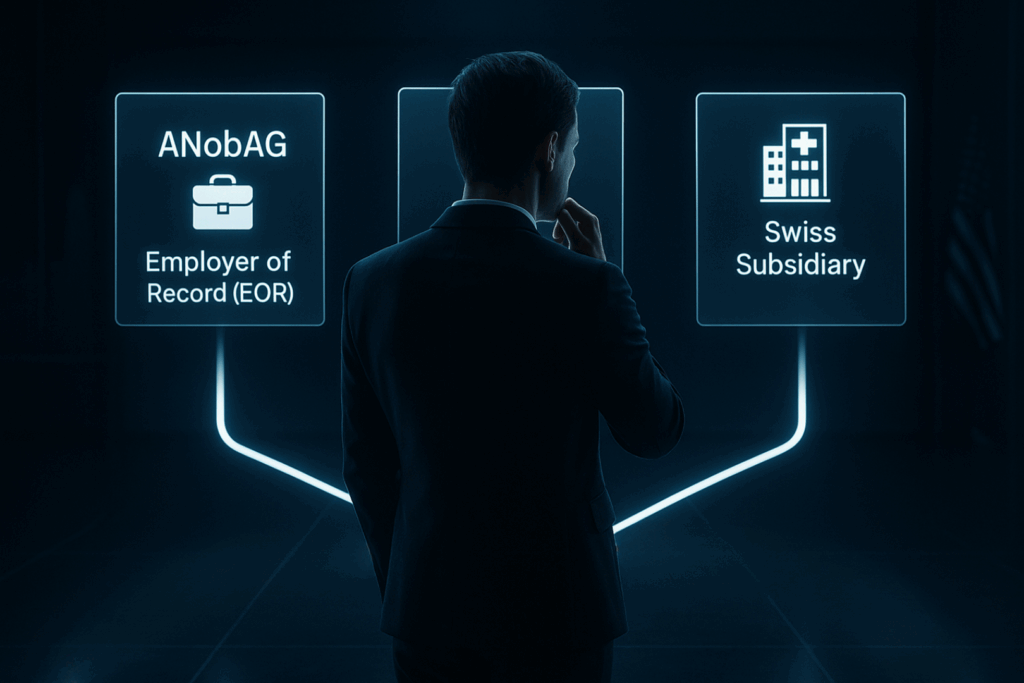Having children in Switzerland
08
Having children in Switzerland
Pregnancy and birth
Organising your pregnancy and childbirth in Switzerland
How can I have a positive experience both during pregnancy and after childbirth? Our tips for a successful experience of parenthood in Switzerland.
What assistance is available?
In Switzerland, an expectant mother can receive help from:
The confederation
The confederation sets the general framework and minimum benefits to be complied with.
The canton
Your canton may provide for additional allowances to those paid by the Confederation.
Your employer
Your canton Your employer may offer more generous coverage than the minimum required by law.may provide for additional allowances to those paid by the Confederation.
What does the law provide for?
14 weeks leave
Whether you are an employee, self-employed, unemployed or receiving a loss-of-earnings allowance at the time of birth, you are entitled to maternity leave of at least 14 weeks (16 weeks for Geneva residents). If you return to work earlier, your entitlement to maternity benefits stops immediately. However, you are prohibited from working during the eight weeks following childbirth (Art. 35 (a) (3) Federal Law on Employment in Trade and Industry).
80% of salary
During maternity leave, you receive 80% of the average income earned before childbirth in the form of a maternity allowance capped at CHF 196 per day. More generous benefits may be stipulated under the cantonal provisions of your place of residence or under your company’s staff regulations. As maternity benefits are considered a salary, contributions to the LPP (Federal Law on Occupational Benefits), AVS (old age and survivor’s insurance), AI and APG (disability and loss of earnings capacity) are deducted. During this period you benefit from accident insurance and occupational pension insurance coverage.
What you need to do to obtain maternity benefits:
- Employee: your employer will automatically pay you the federal and cantonal benefits (if applicable)
- Self-employed, unemployed or unable to work: contact the AVS (old age and survivors insurance) compensation fund
Prerequisites to obtain maternity benefits:
- You must be insured with the AHV for nine months before the birth
- You must have worked for at least five months in the period before the birth
Job protection
Your employer is prohibited from terminating your employment contract during your pregnancy as well as during the 16 weeks following childbirth. This right comes into effect from the first day of pregnancy if you are on a permanent employment contract and after the end of the trial period. In other cases, e.g. during the trial period or a fixed-term contract that is about to expire, you do not benefit from this protection.Paternity benefits
Since 2021, working fathers have been entitled to two weeks’ paternity leave, i.e. ten days off work. They can take this leave within six months of the child’s birth, at a stretch or spread over individual days. It is worth having a look at your employer’s staff regulations to see if there are any special provisions applicable to men. Some companies offer their employees benefits in the form of extended paternity leave and/or “childbirth” bonuses.Summary
Beneficiaries
- Employees
- Self-employed individuals
- Unemployed individuals
- Insurance
(accident,
unemployment, etc)
Conditions to be fulfilled
- 9 months of old age
and survivors insurnace (AVS)
contributions - 5 months of gainful
employment
Paid maternity leave
- 14 weeks (98 days)
Paperwork you need to do
1
At the start of the pregnancy
Tell your employer that you are pregnant. Legally, you are not required to do so, but it is easier to do this in order to benefit from the rights you are entitled to. Be careful, however, because you do not benefit from job protection during a trial period. Take out additional insurance or prenatal health insurance before the birth so you can benefit from additional care during pregnancy or insure your unborn child before birth
2
During the pregnancy
Basic health insurance (LAMal) covers a certain number of treatments without you having to pay the deductible or co-payment, such as:
- check-ups with your doctor,
- two ultrasounds or more if your gynaecologist considers it necessary
- group childbirth preparation courses
Get health insurance for your baby, you can choose any company you like.
Get your baby a pediatrician and get yourself midwife, for the follow-up examinations. Your gynecologist can give you a list of suitable options.
If not yet done, register at the Civil Registry Office.
Reduce your working hours according to the type of work you do: if you work mainly standing up, or evenings or nights, or if you perform dangerous tasks, there are legal provisions in place to protect you during pregnancy and reduce your workload. For example, if you work evenings or nights, you may request to work during the day in a similar role.
If you want to go back to work after your maternity leave, book a place in a nursery or choose an alternative childcare option for your future child. Ask your employer about availing of the company nursery or, if there isn’t one available, find out about the nurseries they recommend. The alternative “Tagesmutter” model is very popular in Switzerland, but there are also a lot of regular nannies. You can easily find addresses online.
3
After the birth
Your health insurance covers the care of a healthy newborn baby, including the stay in hospital after the birth. If you have not already done so, you have three months (with retroactive effect) to take out health insurance for your baby. Register the birth with the authorities In the event of a birth outside marriage:
- Recognition of the child by the father at the Civil Registry Office (before the birth)
- Declaration of joint custody of the child at the Civil Registry Office (before or after the birth)
Maternity leave begins after childbirth. The leave duration is a minimum of 14 weeks, but it may vary depending on the canton and the employer’s conditions. Respect the work prohibition period during the first eight weeks after the birth. Prepare for your return to work. Take your time when it comes to breastfeeding: you are provided with time to pump milk or breastfeed during working hours. Enjoy your baby!
Insider tips
Get on the waiting list for a daycare center early enough. Especially in urban areas, it is necessary sign up at the very beginning of pregnancy or even when you are planning to have a child. Find more information here: www.kibesuisse.ch (only German, French and Italian)
If you give birth in a hospital or birthing center, you will stay about 2-3 nights and only need to bring your personal belongings. Hygiene items, clothes for the baby, etc. will be provided. Many hospitals also organize regular photo shoots, where the baby will be photographed on the 2nd or 3rd day after being born.
Once you are back home from the hospital, basic insurance pays for home visits from a midwife. She will support you for the start of family life, perform small medical examinations and also gives breastfeeding advice f.e.
Different types of care
If you are moving to Switzerland with young children who are not yet of school age, you may need a childcare option. There are numerous childcare models to choose from. Cost plays a big role in the selection, as well as the type of care.
Day care center (Kita)
In a daycare center (Kita), children from infancy to preschool age are cared for. The employees in the daycare centers have pedagogical training and look after the children on weekdays at set times. In most cases, parents can decide on which days and to what extent care is desired. Kitas are run by private sponsors (rarely by the city/community) and must have an operating license from the respective canton. The canton also defines the binding quality standards that must be met in the daycare center. Children are cared for in groups at the daycare center, which is conducive to the child’s socialization – and, in the case of foreign children, also expands their understanding of German, French or Italian. Whether a facility accepts a child or not is decided by the facility itself. Depending on the region, it can take a long time before a place becomes available at a daycare center. It is therefore advisable to look for a place at a daycare center immediately after moving to Switzerland and to be placed on the waiting list of one (or more) facilities. Many daycare centers are organized in associations. One of the largest is kibesuisse. There you will find a first point of contact and can search for daycare centers in your region of residence. Childcare in a daycare center in Switzerland is one of the most expensive in Europe. The costs vary from canton to canton, and even within the cantons the tariff structure is often not uniform among childcare centers. In public facilities, the Kita fee depends on the parents’ income. Families with medium and higher incomes can expect to pay CHF 150 per day if the child is to be cared for throughout the day.

Childminder / day family
As an alternative to daycare, a child can also be cared for by a childminder. If necessary, care is also possible during school age (mostly until 12 years). Usually, the child is cared for at the childminder’s home. The childminder usually looks after several children there (both other people’s children and, if necessary, her own). The advantage of this form of care over daycare is that it is more personal and takes place in a family-like environment. Childminders are often members of a family care association or association. These institutions also often arrange the childcare places, and offer continuing education and professional training for childminders. Payment is therefore usually made to the association or federation, which then forwards the wage to the corresponding childminder. The gross wage for a childminder is on average CHF 8 per hour. Childminders who do not belong to any association or federation negotiate their salary directly with the parents of the child to be cared for. The salary range is between CHF 5 and CHF 15 – depending on demand in the region and experience. Self-employed childminders usually advertise their services via an ad, website or recommendation from others. After consultation, individual care times can also be arranged with a childminder (e.g. care for one night). It is advisable, if not regulated by the association/club, to specify the weekly working hours or working times in an employment contract, as well as the hourly wage and any additional agreements. Nanny The most expensive way of childcare is through a nanny. The nanny looks after all the children in the parents’ home and usually works there by the day. The advantage for the children is that they are cared for in their familiar environment. Since there is no training to become a nanny and most nannies are not organized in associations like childminders, parents should look for good references when choosing. A completed training in the pedagogical field is also conducive. The nanny is an employee in a private household. The salary is a matter of negotiation and is specified in an employment contract. The average hourly wage is CHF 30.
Babysitter
If a child only needs to be looked after for a few hours a week, a babysitter is an inexpensive alternative to a daycare center or childminder. Please note, however, that these are mostly young people who have no pedagogical training and want to supplement their pocket money with the job. The costs for a babysitter amount to CHF 7-12 per hour.
Tax benefits for external childcare
For children or for their care, there are some possibilities for tax deductions in Switzerland to relieve families financially.
Child education
The so-called child deduction amounts to CHF 6,500 per year and applies even to children of full age, provided they are not yet in professional training. The child deduction can also be claimed by parents who live separately. In this case, the parent who has custody of the child or who is primarily responsible for the child’s support must declare the child deduction in his or her tax return. In the case of parents who live separately and who both have custody of the child, each parent claims half of the child deduction.
Parental rate
The federal government provides tax relief for persons who live in the same household with a common child and are mainly responsible for the child’s maintenance by means of a parental rate as a tax deduction. This means that regardless of whether the parents are married or not, the married person rate is assessed as a deduction. In addition, a monetary amount per child is deducted from the tax owed. In concrete terms, this means a tax saving of CHF 251 for the child.
Third party care deduction
The costs of childcare provided by an external person or institution can also be deducted from tax. This deduction for childcare costs can be made until the child reaches the age of 14. It is important for the claim that the outside care is used because both parents go to work or are in training, and therefore cannot take care of the care themselves. Incapacitated parents can also deduct the care from their taxes. The deductions per year amount to a maximum of CHF 10,100. Separated or unmarried parents may divide the deductions between themselves individually. Please note that you will have to prove the costs of care to the authorities upon request. Therefore, keep all receipts related to the care. Excluded from the deductible costs are meals for the child, as well as care costs that are not incurred due to work-related absence of the parents (e.g. babysitter in the evening so that the parents can go out).


